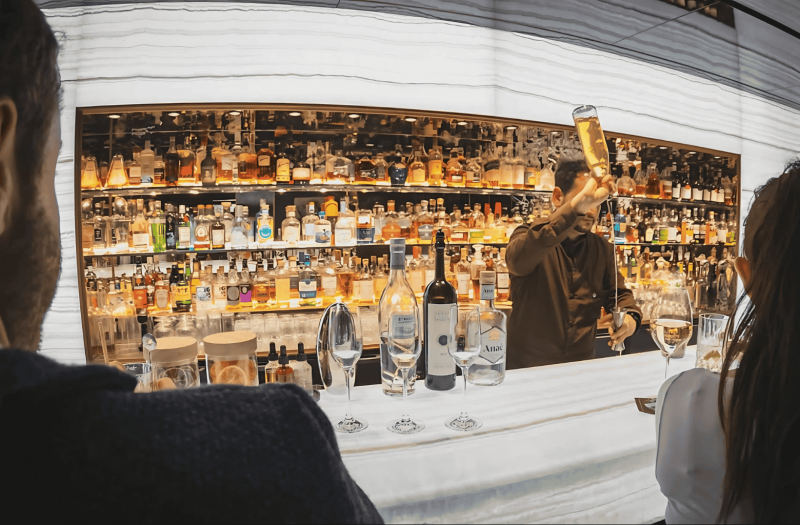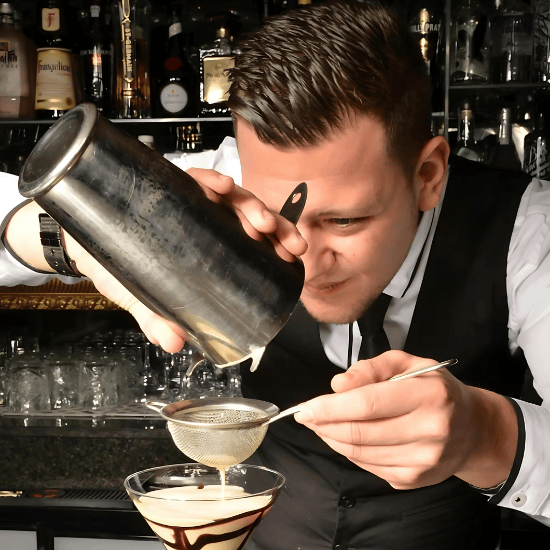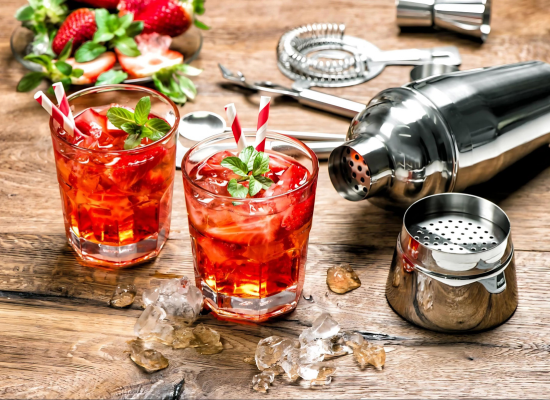Educating Bartenders Worldwide.
By Beverage Trade Network

In 2024, bartending has evolved far beyond the simple task of mixing drinks. It’s a dynamic role that blends technical skill, customer service, and innovation, reflecting the changing preferences of modern consumers. Today’s best bartenders balance tradition with creativity, and their success hinges on a variety of key factors that have been highlighted by industry experts. We’ve done a survey of industry perspectives from around the globe, and here is a summary of what is involved in being a great bartender today.
One of the key qualities that define great bartenders today is the ability to master both classic cocktails and creative, contemporary drinks. Industry observers have noted that having a solid foundation in the classics allows bartenders to experiment and push the boundaries of modern mixology. However, bartenders can no longer rely solely on traditional recipes; they must be able to craft original, signature cocktails that reflect current trends and individual bar identities. Longstanding restaurant critic John Mariani, for example, criticizes the decline in standards at many U.S. bars.
Writing for Forbes, Mariani distinguishes between bartenders who simply pour drinks and those who possess deep knowledge of cocktail preparation, customer service, and professionalism. He laments the prevalence of "mixologists," who often prioritize style over substance, and highlights the widespread ignorance of classic cocktails, such as the Daiquiri and Old Fashioned, especially in the U.S., where many bartenders fail to use fresh ingredients or master basic techniques.
Thus, a duality between tradition and innovation is essential in 2024. Consumers now seek both comfort and excitement in their drinking experiences, which means bartenders must constantly evolve, adapting to new techniques, ingredients, and global influences. Adam Reiner, in VinePair, emphasizes that industry professionals note that bartenders must constantly stay ahead of trends and maintain originality, despite the saturation of cocktail culture. One way to identify new, innovative products is by looking at the winners in spirits competitions, such as the Bartender Spirits Awards. Bartending has become more academic, with professionals expected to study extensively and perfect their craft. Social media and PR pressures have also contributed to the push for innovation, making it difficult to balance style with substance.

Source: Unsplash
The role of the bartender has shifted significantly over the years. No longer just behind-the-scenes creators of cocktails, bartenders now play a crucial role in shaping the overall customer experience. Industry voices have emphasized that in today’s hospitality world, bartenders are expected to offer more than just drinks; they provide interaction, storytelling, and a sense of personal connection. The ability to engage with customers on a personal level helps create memorable experiences that keep patrons coming back. This focus on hospitality is just as important as the technical aspects of drink preparation.
Bartenders who excel at this often develop a loyal following, as they make patrons feel welcome and valued, remembering their preferences and even personal stories. This skill set aligns with the broader trends of customer personalization and experiential hospitality. Reiner expresses that the essential skill of hospitality—connecting with customers and creating a welcoming environment—remains as critical as ever. While bartenders are becoming more "nerdy" and experimental, mastering human interaction and hospitality is still the cornerstone of the profession.
Adaptability is another hallmark of a great bartender in 2024. As consumer preferences shift, bartenders must stay ahead of emerging trends such as the growing popularity of non-alcoholic and low-ABV cocktails. Recent industry analysis highlights how bartenders are increasingly catering to health-conscious consumers, offering creative alternatives that maintain the flavor complexity of traditional cocktails without the alcohol content. This trend speaks to a larger cultural shift toward wellness and mindful drinking.
Nitin Tewari, one of India's leading bartenders and the founder of Bartender, shared his experience with Times Now. Tewari's passion for mixing flavors evolved into a successful career. He emphasizes the importance of foundational knowledge, creativity, and dedication, advising aspiring bartenders to focus on learning and hard work rather than the glamour of the profession. Tewari's philosophy revolves around understanding consumers' preferences, rather than imposing his own. He highlights the growing recognition of bartenders in India, driven by social media, and the rise of cocktail bars.
Bartenders need to be flexible, responding to these shifts by experimenting with new ingredients like botanicals and teas. This ability to innovate and meet diverse demands ensures they remain relevant and appealing to a broader audience.
Sustainability is another significant trend that has influenced the modern bartender’s approach. Today’s bar professionals are expected to adopt eco-friendly practices, such as minimizing waste, reducing plastic usage, and sourcing ingredients locally. This push toward sustainability reflects broader consumer concerns about environmental impact, which are now extending into the world of cocktails. Bartenders who embrace these practices not only contribute to a more responsible industry but also resonate with environmentally conscious customers.
As the industry has highlighted, sustainability is no longer an option but a standard in top-tier bars. Bartenders who make efforts to reduce their carbon footprint through zero-waste practices and thoughtful ingredient sourcing are leading the way in redefining the future of the profession.

Source: Shutterstock
In 2024, technology is reshaping how bars operate, and bartenders are increasingly expected to integrate digital tools into their work. From digital menus to automated ordering systems, technological advancements have improved efficiency and streamlined service in many establishments. However, the challenge for bartenders is maintaining a balance between technological integration and personal interaction. While technology helps optimize operations, great bartenders use these tools without compromising the human touch that defines hospitality.
Understanding how to effectively utilize technology while still delivering exceptional service is a key skill for bartenders navigating the modern landscape. The ability to strike this balance is particularly important in busy, high-volume venues where speed and accuracy are essential.
The best bartenders never stop learning. The rapid pace of change in the beverage industry means that bartenders must stay up to date with new techniques, products, and trends. Whether through attending training sessions, participating in industry events, or simply experimenting with new ideas behind the bar, continuous learning is a defining characteristic of the top professionals in this field.
By constantly seeking out opportunities for improvement, bartenders ensure they remain competitive and relevant in an industry that values innovation and expertise. This commitment to ongoing education not only improves their technical skills but also deepens their understanding of consumer preferences and market trends.
Finally, creativity is more important than ever in 2024, especially when it comes to the visual presentation of drinks. Bartenders are expected to create cocktails that not only taste good but also look appealing—especially in an era where social media plays a huge role in marketing. Drinks that are “Instagram-worthy” can attract more attention and draw new customers. Presentation now involves everything from the choice of glassware to the use of unique garnishes and even the story behind the drink.
Bartenders who can combine creativity with technical skill in both the preparation and presentation of their drinks will stand out in a crowded marketplace. Still, representing the Baby Boomer generation, Mariani writes that great bartenders must be knowledgeable about spirits, create well-balanced drink menus, maintain clean bars, and understand the art of conversation and customer care. He praises bartenders like Colin Peter Field at The Ritz Paris, whose attentiveness, storytelling, and ability to create memorable experiences elevate bartending to an art form. Mariani concludes that great bartenders must be both technically skilled and personable, creating a welcoming, engaging atmosphere for their patrons.
In all, this roundup shows that the qualities that define a great bartender in 2024 are varied and reflect the complexity of the modern beverage industry. Mastery of both classic and innovative cocktails, exceptional customer service, adaptability to trends, commitment to sustainability, and embracing technology are all critical. As industry observers have pointed out, bartenders today must also be lifelong learners, continuously improving their skills and staying ahead of market trends. In a competitive field, those who can combine these elements into a seamless performance will thrive and lead the future of hospitality.
Header Image Source: Unsplash
Also Read:
The 10 Best Bartenders to Follow on YouTube to Master the Art of Mixology
What Will a Profitable Cocktail List in 2025 Look Like?
World's Leading Bartenders